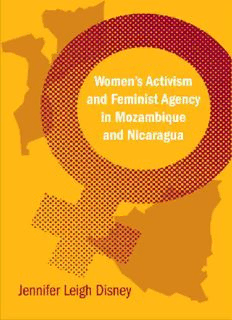
Women's Activism and Feminist Agency in Mozambique and Nicaragua PDF
Preview Women's Activism and Feminist Agency in Mozambique and Nicaragua
Women’s Activism and Feminist Agency in Mozambique and Nicaragua Women’s Activism and Feminist Agency in Mozambique and Nicaragua Jennifer Leigh Disney TEMPLE UNIVERSITY PRESS Philadelphia Jennifer Leigh Disney is Associate Professor of Political Science at Winthrop University. TEMPLE UNIVERSITY PRESS 1601 North Broad Street Philadelphia PA 19122 www.temple.edu/tempress Copyright © 2008 by Temple University All rights reserved Published 2008 Printed in the United States of America Th e paper used in this publication meets the requirements of the American National Standard for Information Sciences—Permanence of Paper for Printed Library Materials, ANSI Z39.48-1992 Library of Congress Cataloging-in-Publication Data Disney, Jennifer Leigh, 1971– Women’s activism and feminist agency in Mozambique and Nicaragua / Jennifer Leigh Disney. p. cm. Includes bibliographical references and index. ISBN 978-1-59213-828-9 (cloth : alk. paper) 1. Women political activists—Mozambique. 2. Women political activists— Nicaragua. 3. Social change—Mozambique. 4. Social change—Nicaragua. 5. Feminist theory—Mozambique. 6. Feminist theory—Nicaragua. I. Title. HQ1236.5.M85D57 2008 305.4209679—dc22 2008014161 Portions of Chapters 5 and 8 appeared in Disney, Jennifer Leigh, “Mozambique: Empowering Women Th rough Family Law,” from Women in African Parliaments, edited by Gretchen Bauer and Hannah Britton, 45–83. Copyright © 2006 by Lynne Rienner Publishers, Inc. Used with permission of the publisher. Portions of Chapters 5 and 6 appeared in Disney, Jennifer Leigh. “Incomplete Revolutions: Gendered Participation in Productive and Reproductive Labor in Mozambique and Nicaragua,” Gender and Globalization: Marxist Feminist Perspectives, a special edition of Socialism and Democracy 18, no. 1 (Jan–June 2004): 7–42. Used with permission of the journal. Portions of Chapters 7 and 8 appeared in Disney, Jennifer Leigh. “Democratization, Civil Society, and Women’s Organizing in Post-Revolutionary Mozambique and Nicaragua,” New Political Science 25, no. 4 (Dec 2003): 533–560. Used with permission of the journal. 2 4 6 8 9 7 5 3 1 Contents List of Maps and Tables vii Preface ix Acknowledgments xiii List of Acronyms xvii 1 “Women Must Occupy and Give Th emselves the Place Th ey Deserve” Women’s Activism and Feminist Agency in Mozambique and Nicaragua 1 2 “Aft er Acknowledging Diff erences, We Must Also See What We Have in Common” Feminist Contestations and Commonalities across First World/ Th ird World, African, and Latin American Divides 20 3 “Doing a Revolution Doesn’t Stop You from Being Machista” Th e Birth of Revolutionary Women’s Organizations and the Limits of Marxism-Leninism in Mozambique and Nicaragua 46 4 “Women Are Not Cows—We Are Active Agents of History” Autonomy Struggles Emerge in Mozambique and Nicaragua 85 5 “Th e Oppressed Woman Is Easier to Deal With” Political Participation, Legal Reforms, and Cultural Constraints in Mozambique and Nicaragua 115 vi / Contents 6 “I Can Do Anything a Man Can Do” Military Participation, Economic Production, and Women’s Emancipation in Mozambique and Nicaragua 142 7 “Th ere Are No Alternatives: Is Th is Really Democracy?” Democratization and Civil Society in Mozambique and Nicaragua 173 8 “Partners in the Home, at Work, and on the Street” Th e Contemporary Women’s Movements and Emergent Feminisms in Mozambique and Nicaragua 196 Appendix 227 Notes 235 Bibliography 259 Index 275 List of Maps and Tables MAPS 1 Country Map of Mozambique xx 2 Country Map of Nicaragua xxi TABLES 1.1 Basic Poverty and Development Indicators in Mozambique and Nicaragua 7 1.2 Selected 2007/2008 UN Development Programme Human and Gender Development Report Indicators 8 5.1 Percentage of Women’s Representation in Assemblies in Mozambique, 1977 117 5.2 Percentage of Women’s Representation in Frelimo, 1999 117 5.3 Women’s Representation as Ministers and Vice Ministers in Mozambique, 1999 and 2005 118 5.4 Percentage of Women’s Representation of FSLN Members of Parliament, 1980–2006 120 5.5 Percentage Women MPs in Nicaragua, 1984–2006 120 6.1 Agricultural Holdings in Nicaragua (%), 1990–1992 153 6.2 GDP Composition and Labor Force Participation by Sector, 2007 155 viii / List of Maps and Tables 6.3 Distribution of Work Time by Gender and Age in Urban and Rural Sectors at the National Level in Productive and Reproductive Spaces (Structural Percentage) in Nicaragua, 1997 159 6.4 Time Allocation of One Day in the Life of a Rural Woman in Nicaragua, 1981 160 Preface W hat is new about women’s organizations and women’s gender interests within socialist revolutionary movements being subsumed by and deemed secondary to male revolutionary leaders and class analysis? Unfortunately, not much. But for scholar-ac- tivists trying to understand what has gone wrong in contemporary eman- cipatory struggles for social change, a detailed account of the theories and practices of such struggles from the perspectives of the women and men directly involved, with all the contradictions, assertions, triumphs, and unintended consequences contained therein, provides not only a tribute to and recognition of those who have struggled before, but also a roadmap of what to adopt and what to try to avoid for future social justice theorizing and organizing. Too oft en, scholars working within a “First World” context work from the presumption that citizens of the “Th ird World” are “practitioners,” while theory is reserved for “First World” academicians. What motivated me to take this project on was the belief that the theories and practices of Th ird World women have a lot to teach to First World feminist theorists and social justice scholars and activists. What propelled me to fi nish this project were the amazing women I met and the compelling and courageous stories they told me. It is to them and for them that I dedicate this book, for the richness of my work lies in the voices of the women and men who shared their lives with me, and it is for them and their struggles that I rely so heavily on their personal accounts and hope to do their stories justice.
Description: